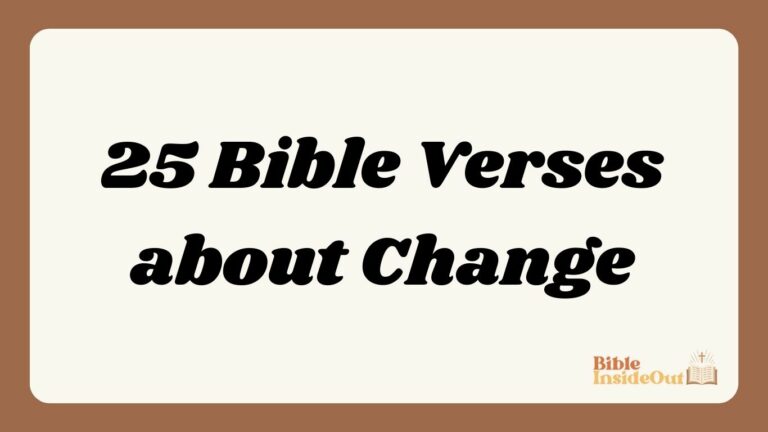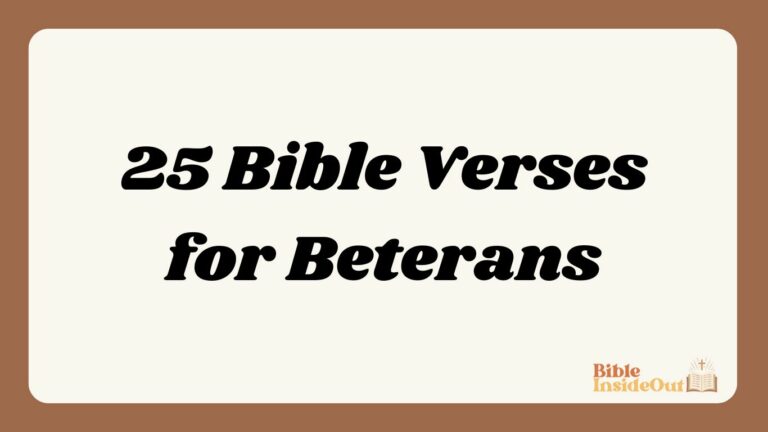26 Bible Verses About Paying Debt (With Commentary)
Debt is hard. The Bible says we should pay back what we owe. Our guide shares verses about handling and paying off debts, so you can feel lighter. Want to know how? Keep reading.
Moral Obligation to Pay Debts

The Bible teaches we should clear our debts. This means money, respect, and honor to others. Romans 13:8 urges not to keep any debts. Being free from debt helps us live rightly. Psalm 37:21 points out, good people pay back what they owe; the wicked do not.
Proverbs 3:27-28 advises helping others with what you have. If you can help now, do it without delay. Clearing debts shows fairness and kindness.
Romans 13:8
"Let no debt remain outstanding, except the continuing debt to love one another, for whoever loves others has fulfilled the law."
Romans 13:8 says we should pay off our debts but always show love. This teaching changed how I saw my own debt. It became about more than money; it was about living right and being kind.
Debt can make us feel like servants to lenders. Staying out of debt helps us live freely and respect ourselves and others. We must keep showing love, no matter what our bank account says.
Psalm 37:21
"The wicked borrow and do not repay, but the righteous give generously;"
Psalm 37:21 tells us that wrongdoers borrow but don’t pay back. This warns us about the trouble of not returning debts. Owing money can feel like a heavy weight, slowing you down and making life hard.
Paying back what we owe is key to honesty and responsibility. It lifts our spirits and keeps us free from debt’s burden. By doing this, we show respect for others and follow a path leading to peace.
Proverbs 3:27-28
"Do not withhold good from those to whom it is due, when it is in your power to act. Do not say to your neighbor, ‘Come back tomorrow and I’ll give it to you’— when you already have it with you."
Proverbs 3:27-28 teaches us about paying debts quickly. If you owe money, and you can pay it, do so without delay. This Bible verse shows the importance of treating people fairly by returning what we owe them.
Acting this way demonstrates love and respect for others. Doing the right thing aligns with God’s wishes for how we live.
By helping our neighbor when we have the means, we show kindness and wisdom. This practice is not just smart; it’s also a reflection of good character that pleases God.
Caution Against Debt

The Bible tells us debt makes us like slaves. When we owe money, we lose freedom because someone has control over us. Debt is similar to sin because it traps us.
Owing money goes against God’s plans for us. It breaks two major rules from the Bible about how we should live with Him and others. We must pay back our debts, including taxes and bills, and show respect where it’s due.
Being in debt can make it tough to honor these obligations to God and those we owe.
Proverbs 22:7
"The rich rule over the poor, and the borrower is slave to the lender."
Proverbs 22:7 teaches that debt gives the rich control over the poor. It warns against owing money because it can limit your freedom. I learned this lesson myself after falling into credit card debt.
Feeling trapped, I worked hard just to pay off my debts. By taking Proverbs 22:7 to heart, I changed my approach. I focused on paying off my debts and avoiding new ones. This helped me regain control of my finances and find peace.
Now, I enjoy financial freedom by following these scriptures’ wisdom.
Proverbs 22:26-27
"Do not be one who shakes hands in pledge or puts up security for debts; if you lack the means to pay, your very bed will be snatched from under you."
The Bible, in Proverbs 22:26-27, warns against making vows to pay for someone else’s debts. It says you could lose your valuable things, like your bed, if you can’t pay. This teaches us to handle money wisely and avoid diving into others’ financial issues.
Debt can create big problems and make us lose essential items.
It’s important to think carefully before agreeing to cover another person’s debt. This wisdom keeps us safe from financial troubles and protects our valuables. The Bible offers clear guidance on staying free from the traps of debt.
Proverbs 17:18
"One who has no sense shakes hands in pledge and puts up security for a neighbor."
Proverbs 17:18 warns against promising to pay for someone else’s debt. Doing so can put your own money or house in danger if they fail to repay. Many people try to help friends this way but find themselves in financial trouble when things don’t go as planned.
This verse teaches us to take care of our assets and avoid risking them for others’ mistakes. Keeping finances secure is a key lesson from this scripture, highlighting the importance of being cautious with promises that may lead to losing what we have worked hard for.
Deuteronomy 28:12
"The LORD will open the heavens, the storehouse of his bounty, to send rain on your land in season and to bless all the work of your hands. You will lend to many nations but will borrow from none."
Deuteronomy 28:12 teaches us about God’s promises. It says God will give rain for our crops if we follow His commands. We should be the ones lending, not borrowing. This means we trust God over debts.
The Bible makes it clear that managing money wisely and relying on God leads to blessings. Being debt-free is part of a blessed life according to God’s plan.
Consequences of Debt

Being in debt is hard. The Bible says the rich have power over the poor, and if you’re in debt, you’re like a servant to your lender. This truth hits hard for many people trapped by money they owe.
They work tirelessly but can’t seem to get ahead because of their debts.
Debt also causes worry. Thinking about how to repay what you owe can steal your peace of mind at night. It even strains relationships with friends and family members when promises tied to money become burdensome.
The desire to be free from debt comes from experiencing these struggles firsthand. Everyone wants a better life without financial burdens for themselves and their loved ones.
Proverbs 6:1-5
"My son, if you have put up security for your neighbor, if you have shaken hands in pledge for a stranger, you have been trapped by what you said, ensnared by the words of your mouth. So do this, my son, to free yourself, since you have fallen into your neighbor’s hands: Go—to the point of exhaustion— and give your neighbor no rest! Allow no sleep to your eyes, no slumber to your eyelids. Free yourself, like a gazelle from the hand of the hunter, like a bird from the snare of the fowler."
Proverbs 6:1-5 warns us about the risks of taking on someone else’s debt. If you co-sign a loan, it could become your problem. This part of the Bible tells us to be careful with our promises.
It suggests acting fast to fix these mistakes.
Co-signing can trap you like being tied up. The Bible says to free yourself quickly from debt that isn’t yours. I found out the hard way by signing for a friend’s car loan and had to pay when they couldn’t.
Fast action is key in avoiding or fixing co-signed debts. It saves stress and money.
Matthew 18:23-35
"Therefore, the kingdom of heaven is like a king who wanted to settle accounts with his servants. As he began the settlement, a man who owed him ten thousand bags of gold was brought to him. Since he was not able to pay, the master ordered that he and his wife and his children and all that he had be sold to repay the debt."
Jesus tells a story in Matthew 18:23-35. A king wants to settle accounts. He forgives a servant’s huge debt, letting him go free. This servant then demands payment from someone who owes him a little money.
He refuses to show mercy.
The king gets angry when he hears this. He had forgiven a big debt, but his servant wouldn’t forgive a small one. The unforgiving servant faces punishment for not being merciful like the king.
Jesus uses this story to teach us about forgiveness. It shows we must forgive others as God forgives our sins against Him. This lesson is vital for handling debts and our spiritual lives alike.
Deuteronomy 15:1-2
"At the end of every seven years you must cancel debts. This is how it is to be done: Every creditor shall cancel any loan they have made to a fellow Israelite. They shall not require payment from anyone among their own people, because the Lord’s time for canceling debts has been proclaimed."
The Bible, in Deuteronomy 15:1-2, talks about a rule. Every seventh year, people had to cancel debts. This helped everyone start fresh. It showed care and forgiveness even back then.
This rule was for Hebrews only. If you borrowed money from someone in your community, they couldn’t ask for it back after the seventh year. This didn’t cover all deals or promises—just unpaid loans.
Forgiving a loan to a friend made me feel good. It was like following what I read on a smaller scale.
Nehemiah 5:1-13
"Now the men and their wives raised a great outcry against their fellow Jews. Some were saying, “We and our sons and daughters are numerous; in order for us to eat and stay alive, we must get grain.” Others were saying, “We are mortgaging our fields, our vineyards and our homes to get grain during the famine.” Still others were saying, “We have had to borrow money to pay the king’s tax on our fields and vineyards."
Nehemiah 5:1-13 tells a story about a tough time. People owed money because there was not enough food and the Persian taxes were high. They had to get loans, and some even sold their children to pay what they owed.
Nehemiah saw this problem and thought it was wrong. He gathered everyone and made the rich lenders cancel the debts. This stopped them from taking fields, vineyards, or houses as payment.
The story shows us it’s important to be fair and help those who need it. Nehemiah didn’t just stick to the rules; he did more by making sure people treated each other right. This stands against using others for gain—a big issue today with unfair loans and money gaps.
Nehemiah proved good leaders serve their community, push for fairness, and support others through hard times without wanting anything in return.
Financial Stewardship

The Bible teaches us that God owns everything we have. We should manage it well. Luke 14:28-30 tells us to plan ahead, especially with money.
Loving money too much can lead to trouble, as 1 Timothy 6:10 says. But, using our resources wisely makes God happy. This is shown in Matthew 25:27 and Luke 16:11. Being good stewards of what we have is important, no matter if it’s a little or a lot.
Luke 14:28-30
"Suppose one of you wants to build a tower. Won’t you first sit down and estimate the cost to see if you have enough money to complete it? For if you lay the foundation and are not able to finish it, everyone who sees it will ridicule you, saying, ‘This person began to build and wasn’t able to finish.’"
Luke 14:28-30 teaches us to be smart with our money. You need to know if you have enough money before you start building a house. This keeps people from laughing at you if you can’t finish it.
Planning ahead helps us avoid problems later.
This verse tells us the Bible cares about how we deal with cash and debts. Being wise and faithful with what we have is important. It talks about preparing and being responsible with our finances.
Always think first before making money decisions.
1 Timothy 6:10
"For the love of money is a root of all kinds of evil. Some people, eager for money, have wandered from the faith and pierced themselves with many griefs."
1 Timothy 6:10 warns us about the dangers of loving money. It tells us that wanting to be rich can lead to serious problems. People might do harmful things, like lying or stealing.
They could even lose their faith in Christ Jesus.
Loving money too much is risky. It can make you forget what’s truly important. The Bible wants us to focus on following Lord Jesus Christ and living a life full of good deeds, not just chasing wealth.
Following God and keeping His commandments should come first. Money and possessions are temporary, but our relationship with Christ offers eternal life and true happiness.
Matthew 25:27
"Well then, you should have put my money on deposit with the bankers, so that when I returned I would have received it back with interest."
Matthew 25:27 tells us to use money wisely. It talks about a servant who didn’t manage his master’s money well and faced trouble. This shows us that God sees managing debt as important.
The Bible lesson here is clear. If we borrow money, we should pay it back. Like the servant with his master, we have responsibilities. Being smart with what God gives us and keeping promises when borrowing are key points.
This teaches financial stewardship in the eyes of God and our duty toward debts.
Luke 16:11
"So if you have not been trustworthy in handling worldly wealth, who will trust you with true riches?"
Luke 16:11 shows how managing small amounts of money wisely can prepare us for bigger blessings. Struggling with credit card debt taught me this lesson well. Every dollar spent felt wasteful, but adopting this Bible verse changed my perspective.
Handling finances properly reflects our faithfulness to God. He sees how we manage debts and responsibilities, like taxes and respect.
The concept of stewardship and generosity is clear in the Bible. By reducing my debts, I learned to live within my means and help others do the same. It was tough at first, but focusing on cutting down what I owed made me rethink money and relationships.
Keeping a budget, tracking expenses, and saving for those in need became habits that enhanced both my financial stability and spiritual health.
Encouragement to Settle Debts

The Bible teaches to pay our debts. Matthew 5:25-26 and Luke 12:58-59 say to settle debts quickly to avoid problems. God values keeping promises, including paying back what we owe.
Leviticus 25:35-37 and Proverbs 11:15 advise helping others without making their debt burden worse. Proverbs 31:16 suggests using wise investments to pay off debts. The message is clear – live honestly, assist others, and work hard to avoid the trap of debt.
Matthew 5:25-26
"Settle matters quickly with your adversary who is taking you to court. Do it while you are still together on the way, or your adversary may hand you over to the judge, and the judge may hand you over to the officer, and you may be thrown into prison. Truly I tell you, you will not get out until you have paid the last penny."
Matthew 5:25-26 urges us to pay our debts quickly. Owing someone can lead to trouble, like a court case we can’t control. This advice isn’t only about money but also fixing issues with actions and words.
It’s crucial to make amends fast and not dodge responsibilities. These verses highlight the need for peace and responsibility in our lives. They show that God values honesty and unity in our relationships.
Luke 12:58-59
"As you are going with your adversary to the magistrate, try hard to be reconciled on the way, or your adversary may drag you off to the judge, and the judge turn you over to the officer, and the officer throw you into prison. I tell you, you will not get out until you have paid the last penny."
Luke 12:58-59 teaches us to settle debts quickly. It warns that waiting too long can lead to being taken to court or even jail until every penny is paid off. I knew someone who ignored his debts and faced tough consequences, just like in this passage.
This shows why it’s crucial to deal with our financial responsibilities fast.
The Bible repeatedly advises us to pay off our debts promptly. Ignoring them can result in severe problems, such as losing freedom or getting stuck in difficult financial situations.
Taking care of debts early helps avoid these issues and maintains good relationships with others.
Leviticus 25:35-37
"If any of your fellow Israelites become poor and are unable to support themselves among you, help them as you would a foreigner and stranger, so they can continue to live among you. Do not take interest or any profit from them, but fear your God, so that they may continue to live among you. You must not lend them money at interest or sell them food at a profit."
Leviticus 25:35-37 tells us to help people who have debts. The Bible says not to make things harder for them. If you lend money or food, don’t charge extra. This teaches kindness and fairness, avoiding profit from someone else’s trouble.
The scripture also advises against treating debtors as permanent workers unfairly. Everyone deserves respect and fair treatment, especially in tough times. The goal is to lend support without seeking gain or imposing high fees or demands.
Proverbs 11:15
"Whoever puts up security for a stranger will surely suffer, but whoever refuses to shake hands in pledge is safe."
Proverbs 11:15 warns us against co-signing loans, especially for strangers. I learned this lesson after I became a guarantor for an acquaintance’s loan. When they failed to repay, the lenders turned to me for the money.
This verse in Proverbs shows that getting involved in other people’s financial issues can lead to trouble and regret.
The Bible advises us to be wise and cautious with our finances. From my experience, sometimes saying no is necessary to protect our own financial well-being. Following the guidance from Proverbs can prevent unnecessary problems and losses.
Proverbs 31:16
"She considers a field and buys it; out of her earnings she plants a vineyard."
The woman in Proverbs 31:16 is careful with her money. She thinks a lot before buying a field. This teaches us to be smart with our finances.
She uses her business skills wisely. Every choice she makes aims for good results. This shows the importance of making smart financial decisions for security and stewardship.
Examples of Debt Resolution

In 2 Kings 4:1-7, a widow solves her debt problem with faith and quick thinking. She borrows jars from neighbors and fills them with oil. Selling the oil pays off her debts and saves her sons.
Nehemiah 10:31 teaches about avoiding new debts in tough times. This shows smart money management.
Luke 7:41-43 shares a story of two people who owed money but were forgiven their debts. This parable emphasizes mercy as a way to handle debt.
Philemon 1:18-19 talks about Paul stepping in to pay any debt Onesimus might have caused. Paul asks Philemon for forgiveness, highlighting kindness in dealing with debts owed to others.
2 Kings 4:1-7
"The wife of a man from the company of the prophets cried out to Elisha, ‘Your servant my husband is dead, and you know that he revered the Lord. But now his creditor is coming to take my two boys as his slaves.’ Elisha replied to her, ‘How can I help you? Tell me, what do you have in your house?’ ‘Your servant has nothing there at all,’ she said, ‘except a small jar of olive oil.’ Elisha said, ‘Go around and ask all your neighbors for empty jars. Don’t ask for just a few. Then go inside and shut the door behind you and your sons. Pour oil into all the jars, and as each is filled, put it to one side.’ She left him and shut the door behind her and her sons. They brought the jars to her and she kept pouring. When all the jars were full, she said to her son, ‘Bring me another one.’ But he replied, ‘There is not a jar left.’ Then the oil stopped flowing. She went and told the man of God, and he said, ‘Go, sell the oil and pay your debts. You and your sons can live on what is left.’"
A widow had a big debt and faced losing her sons to slavery. She asked prophet Elisha for help. He told her to get empty jars from neighbors and fill them with oil she had. By a miracle, the oil didn’t stop flowing until all jars were full.
She sold the oil, paid her debts, and saved her sons.
This story teaches us that God knows about our money problems and wants us to ask for help while trusting Him to provide. I was once buried in bills without a way out. I relied on faith, sought advice, and slowly found better ways to manage my money.
The key is not being scared to seek help or trust in higher powers when overwhelmed by financial issues.
Nehemiah 10:31
"When the neighboring peoples bring merchandise or grain to sell on the Sabbath, we will not buy from them on the Sabbath or on any holy day. Every seventh year we will forgo working the land and will cancel all debts."
Nehemiah 10:31 talks about Israel’s promise to God. They decided not to collect debts in the seventh year. This was part of a bigger plan that also stopped buying or selling on the Sabbath.
It showed respect for rest and forgiveness times set by God. The goal was to forgive debts every seventh year, as Moses taught.
This rule helped those who owed money. It taught everyone to be kind with debt. People wanted to live better together without letting anyone suffer from too much debt. The message was clear: Be nice with money matters, like you would want others to be with you.
Luke 7:41-43
"Two people owed money to a certain moneylender. One owed him five hundred denarii, and the other fifty. Neither of them had the money to pay him back, so he forgave the debts of both. Now which of them will love him more? Simon replied, ‘I suppose the one who had the bigger debt forgiven.’"
In Luke 7:41-43, Jesus shares a story about a moneylender and two people with debts. One owed much more than the other. Neither could pay back their debt. The moneylender chose to forgive both debts, showing the power of forgiveness.
This part of the Bible helps us learn about grace and kindness through forgiving others. It compares our mistakes to debts we owe God, highlighting that He forgives us freely.
I had to forgive a friend who couldn’t return money they owed me. This story helped me see that forgiveness isn’t just about money but also about being kind and understanding, like how God treats us.
The tale teaches important lessons on grace—the idea that God clears our debts of sin without holding it against us, similar to the lender in Jesus’ story.
Philemon 1:18-19
"If he has done you any wrong or owes you anything, charge it to me. I, Paul, am writing this with my own hand. I will pay it back—not to mention that you owe me your very self."
Paul had a friend, Philemon. Paul asked him to forgive any debt Onesimus owed. He even offered to pay it back himself. This teaches us as followers of Christ, we should help others with their mistakes and debts.
Verse 19 talks about a different kind of debt. It’s not money but something bigger—salvation. Paul led Philemon to Jesus, which means Philemon’s spiritual life was thanks to Paul’s help.
Here, Paul wasn’t trying to make Philemon feel guilty but wanted to highlight the value of forgiving and aiding others without expecting anything back.
Debt Forgiveness

Debt forgiveness is important in the Bible. It teaches that if you forgive someone’s debt, you will receive blessings. This idea comes from practices like forgiving debts every seven years and the Jubilee, which erases all debts.
Jesus shared stories to show how forgiving others changes lives for the better. By letting go of debts, we follow God’s example and spread kindness.
Jesus’ teachings encourage us to love people without expecting anything back. When I forgave a friend who owed me money, it was tough at first. But then, good things started happening for me.
The Bible wants us to understand that showing mercy brings joy not just to others but to us too.
So, when we decide to erase debts or not hold them against someone, we’re acting like Jesus did. We’re choosing love and mercy over keeping track of what’s owed—a powerful way of living that makes everyone better off.
Matthew 6:12
"And forgive us our debts, as we also have forgiven our debtors."
Matthew 6:12 teaches the power of forgiving debts, as shown in the Lord’s Prayer. This verse connects forgiveness of money owed to us with asking God to forgive our sins. It encourages kindness and understanding in money matters, creating less stress and more compassion.
Luke 6:34-35
"And if you lend to those from whom you expect repayment, what credit is that to you? Even sinners lend to sinners, expecting to be repaid in full. But love your enemies, do good to them, and lend to them without expecting to get anything back. Then your reward will be great, and you will be children of the Most High, because he is kind to the ungrateful and wicked."
Luke 6:34-35 talks about giving money without expecting it back. This act shows love and kindness like God’s love for us. Jesus wants us to help even those who can’t repay us. Doing this makes us true friends of God and spreads His love.
I helped someone in need with money. They couldn’t pay me back soon, but knowing these Bible verses brought me peace. It felt good to share God’s generosity, looking for nothing in return yet feeling spiritually rich.
What Does the Bible Say About Paying Debt?
The Bible says we should pay our debts. Romans 13:8 tells us to only keep the debt of love unpaid. This means God wants us to be wise with money and clear our debts. I found that handling money well is part of living a life based on Biblical values.
Proverbs 22:7 shows that being in debt makes us servants to those we owe. This idea helped me work towards freedom from my debts, emphasizing how important it is to be financially independent with faith as the foundation.
The Bible guides us in real life, teaching us not to get trapped by debt and to forgive others’ debts, as mentioned in Matthew 6:12, which helps bring peace beyond just money matters.
Conclusion
Clearing debts matters a lot. The Bible says we need to pay what we owe, both to others and to God. Doing this shows respect and keeps our promises. Ancient wisdom from the Bible teaches us to be true with our words, smart with money, and honest in promises.
This helps us live rightly and faithfully.







